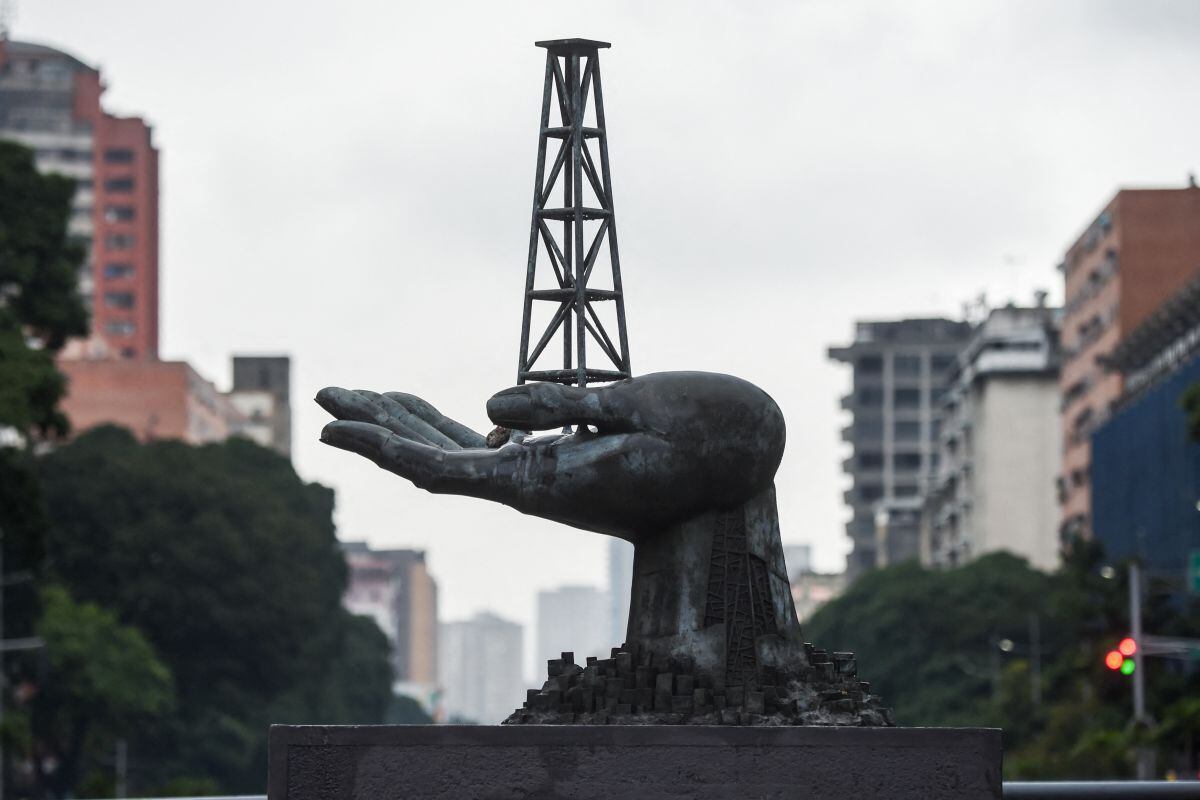:quality(75)/cloudfront-us-east-1.images.arcpublishing.com/elcomercio/J5XEGLLTOJECLNSPG5RRANPBBY.jpg)
Senior North American officials announced this Wednesday, the 17th, that the Washington government will not renew the license 44 granted six months ago to Venezuelawhich implies the reimposition of sanctions on oil and gas that until then weighed on the Caribbean country.
The government of U.S I had been evaluating such a measure for months due to the obstacles that Chavismo poses to the opposition’s registration for the July 28 presidential elections.
TO LOOK: The United States reimposes sanctions against Venezuela’s oil and gas sector
On October 17, 2023, the Nicolás Maduro regime and the Venezuelan opposition signed the so-called Barbados Agreement, which was based on two pillars: guaranteeing democratic and fair elections; and protect the nation’s vital interests, such as overseas assets and territorial defense. This last point focused mainly on the Essequibo dispute between Venezuela and Guyana.
In exchange for this agreement, the United States Department of the Treasury’s Office of Foreign Assets Control (Ofac) issued License 44, a special license that authorized international companies to produce and sell Venezuelan oil and gas, as well as pay for goods and related services, investments and delivery of oil and gas to creditors of the Government of that country, through the United States financial system.
In January, however, faced with the disqualification of opposition candidate María Corina Machado by the Venezuelan Supreme Court, the State Department announced that it was beginning to evaluate the validity of said license.
Machado’s disqualification was later added to the arrest of seven members of his team and the veto of Corina Yoris, appointed a few weeks ago as his replacement. “We have witnessed a disturbing campaign of harassment and intimidation against opposition actors solely for exercising their political rights“, said a senior US official on condition of anonymity during a telephone press conference, according to the AFP news agency.
This accumulation of actions aimed at preventing Maduro from having a rival in charge with real possibilities of taking power from him has been reason enough for the United States to re-enact sanctions starting this Thursday, the 18th.
“This is the chronicle of a death foretold. The Venezuelan regime committed itself to the US to comply with a series of actions, which it evidently did not comply with. This led us to this situation. The Barbados Agreement said clearly: if conditions are not met, sanctions will return“, he comments The trade Venezuelan political analyst José Carrasquero.
“The regime insisted on creating an electoral process adapted to its needs, in which a large sector of the opposition was ignored. In Barbados it was agreed that it would include all Venezuelans“adds the specialist.
After the United States, the European Union and the Lima Group imposed drastic sanctions on Venezuela for considering the 2018 elections fraudulent, the lowland country’s oil industry reached its lowest production record, with less than 500 thousand barrels per year. day.
“In Venezuela we have an economy dependent on oil, without this money the regime cannot finance the little that continues to operate here”, says Carrasquero.
With the lifting of sanctions, the country achieved an increase of between 200,000 and 300,000 barrels per day. “This, plus the possibility of reducing the discount at which oil exports were sold, could allow the country to receive between 6,000 and 7,000 million dollars annually this year.”, explained Alejandro Arreaza, economist at Barclays Latin America, to CNN Dinero.

“In these months the private economy was boosted independently of the government and it was because this time the regime did not mess with the dollar. Before, every dollar went to the State, if you needed a dollar it had to go to the State. This ended up generating a parallel black market. When the sanctions were lifted, Maduro did something crazy with the dollar issue and this led to a provisional return of the oil industry. The hospitality industry, transportation demands, everything that requires getting this industry up and running have been reinvigorated.”, says Carrasquero.
The reestablishment of sanctions therefore implies a return to a reality closer to 2019, when the Chavista regime had to support the majority of its sales in the Chinese and Indian markets, something that for the Venezuelan analyst is insufficient.
“The government claims that it is negotiating with Indian oil companies, I don’t know how true that is. Venezuelan oil is very heavy, requiring much more advanced technology to be processed. That’s why Chevron had to open a new well with this technology, to extract crude oil. It is a technology that India or China do not have because they work with other oil companies”, he comments.
However, Carrasquero fears that this new crisis in the Caribbean country will actually cause little damage to the Chavista leadership and that it will be the citizens who will suffer the consequences.
“For the regime, the coup is not very significant because it will continue to have resources; Those who suffer most from this situation are ordinary Venezuelans; Citizens will see that their purchasing power will continue to decline and their future will become more difficult. Since the people end up paying the sanctions, the regime doesn’t care much“, ensures.
Source: Elcomercio
I am Jack Morton and I work in 24 News Recorder. I mostly cover world news and I have also authored 24 news recorder. I find this work highly interesting and it allows me to keep up with current events happening around the world.






